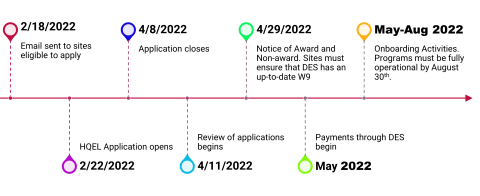High Quality Early Learning (HQEL)
High Quality Early Learning (HQEL)
The Arizona Department of Education (ADE) Early Childhood Education (ECE) believes that every family should have an opportunity to choose a high quality early and care and education setting that promotes positive development of their child. Scientists, economists, and educators recognize research suggests early care and education beginning at birth is an investment that pays dividends as children enter kindergarten, move through the early elementary grades, transition to college or a career, and become adult citizens in their community. Families that choose early care and education programs for their children do so for a variety of reasons and should have options for programs that are high quality, are available where families live and work, and are affordable.
HQEL Guidance Manual
ADE ECE has an opportunity to support early childhood programs in high needs communities (HNC) through the High Quality Early Learning Grant (HQEL). The purpose of the HQEL, offered through the Arizona Department of Economic Security- Child Care Administration, is to support Arizona in developing and enhancing capacity to deliver high-quality preschool programming as well as implement and sustain quality preschool for eligible children, increasing the number of children who receive high quality early care and education services and improving young children’s success in school and beyond. High-quality early childhood services that include comprehensive services have been strongly linked to both academic and life skills success among children. Research shows children who come from families with several risk factors show the most gain from access to high quality early childhood programs.
HQEL offers an opportunity for children and families to access high quality early childhood programs by allocating funds to programs located in HNCs. Funding will support programming for those children who may not otherwise have access to high quality early care and education prior to kindergarten entry by either increasing the number of hours that children participate in a high-quality program or by increasing the number of children who are served.
High Quality Early Learning (HQEL) Eligibility
The High Quality Early Learning Grant (HQEL) is a competitive application process open to eligible quality early learning programs. Eligibility does not automatically conclude grant award. The ADE ECE will work in collaboration with early childhood system partners to identify eligibility indicators that will be used to curate a list of early learning programs that will be eligible to apply. Eligible applicants will be determined based on a weighted measure and cut scores as determined by the ADE ECE and system partners.
Those programs determined eligible to apply will be awarded based on a competitive application process in year one.
Please note that early learning programs may be subject to an onsite visit prior to determining grant participation. This onsite visit may include onsite interviews with staff, review of program alignment to the Program Guidelines for High Quality Early Education (PGHQE), and a visual inspection of the HQEL classrooms.
Those early learning programs awarded will continue with participation during the grant life cycle under the DES umbrella (obligation of funds by June 30, 2024). Once awarded, programs must be licensed, and remain “in good standing or in substantial compliance” as defined by their regulatory agency throughout their participation in the grant. A program being placed on enforcement action for any reason may result in the revocation of funding and revocation of program participation. In addition, all awarded programs must engage in authentic on-going progress monitoring and assessment using the AZ State board approved progress monitoring tool. Currently this tool is Teaching Strategies GOLD. All awarded programs must use this tool for impacted children.
Sites Eligible to Apply
Informational Webinar
HQEL Informational Slide Deck (ENGLISH)
Diapositivas Informativas de HQEL (ESPAÑOL)
Payment Information
All payments for the HQEL Grant are coming directly from the Department of Economic Security (DES) Child Care Administration. These payments are allocated for the same amount each month and are based on the number of full-time equivalent (FTE) slots requested in the HQEL grant application.
For payment related questions, please email: [email protected]
Document Templates
HQEL Programs can use the following document templates for enrollment and monitoring.
EMAC
HQEL monitoring documents will be sumitted via the EMAC platform through ADEConnect.
- Videos:
- Guidance Documents:
HQEL Grant Timeline:
- 2/18/2022 - Email sent to sites eligible to apply
- 2/22/2022 - HQEL Application opens
- 4/17/2022 - Application closes (Extended from April 8)
- 4/11/2022 - Review of applications begins
- 4/29/2022 - Notice of Award and Non-award. Sites must ensure that DES has an up-to-date W9.
- May 2022 - Payments through DES begin
- May-Aug 2022 - Onboarding Activities
- Aug 30, 2022 - Programs must be fully operational
ECQUIP
One key process we have in place is the Early Childhood Quality Improvement Practices (ECQUIP) process. ECQUIP was developed by the Early Childhood Education unit as a continuous improvement process to ensure quality and accountability among schools within an Early Childhood Program receiving state funding through the ECE unit of the Arizona Department of Education. ECQUIP is a process to bring early care and education providers and stakeholders together to break down silos, improve communication, and align quality goals. ECQUIP continues to be a vehicle for all early childhood programs to partner and build quality preschool for all Arizona’s young children.
Quality Programming
Children who participate in high quality early education programs are exposed to academics in a way that nurtures the whole child and encourages them to engage in activities with responsive, nurturing adults who promote children’s optimal development when they’re not with their families. Historically, preschool programs and elementary education have remained separate for a variety of reasons including different funding sources, infrastructures, values, and traditions. Preschool has not typically been viewed as a part of public education for two primary reasons: (1) It is not universally funded by the public; and (2) It is not a mandated grade level. Due to the now-recognized importance of the role early care and preschool play in the education of our children, there is a critical need for high quality programs that provide children with the foundational skills and knowledge they need to be successful learners.
There are many factors that contribute to a high quality early care and education program. Some of these critical elements include:
- Class or group size;
- Child-adult ratios;
- Curriculum;
- Developmentally appropriate instructional strategies; and
- Interactions and relationships between staff, children, and their families.
The level of staff preparedness and stability, the opportunity for on-going training, and the responsive supervision of staff play equally important roles in ensuring quality early learning experiences for children.
The HQEL grant will be using the alignment to the High Program Quality Guidelines, Quality First Participation, Head Start Affiliation, or National Accreditation to determine program quality.
Program Guidelines for High Quality Early Education: Birth through Kindergarten (PGHQ)
Quality First Participation
National Accrediation
- National Accreditation Commission for Early Care and Education Programs (NAC)
- National Association for the Education of Young Children (NAEYC) Accreditation
- National Early Childhood Program (NECPA) Accreditation
Early Literacy
Arizona is committed to supporting and improving the literacy skills of all of our children. Arizona will be leveraging the HQEL Grant opportunity to provide a comprehensive and systemic approach to advancing literacy skills among disadvantaged children in early childhood, including children living in poverty, English learners, children with disabilities, and those belonging to a subgroup that is otherwise underrepresented.
With intentional coordination and collaboration between and among early childhood education programs and system partners, targeted evidence-based strategies will be deployed at HQEL sites to produce measurable gains in language and literacy outcomes.
These strategies may include, but are not limited to:
- Access to high-quality preschool programming
- Practitioner training in the Science of Reading
- Literacy coaches, supports, and resources
- Research and evidence-based curricula
- Training on the Language Essentials for Teachers of Reading and Spelling (LETRS)
Resources:
Cox Campus (FREE Training)
- Video: Early Literacy & Cox Campus
- Website: Cox Campus
- Flyer: AZ Workforce Registry Cox Campus
The following sites below have been awarded the HQEL Grant. These sites will utilize the next two years to provide high-quality preschool programing to their communities youngest learners. Congratulations to the HQEL grantees!!
Preschool Program | City | ||||||||||||||||||||||||||||||||||||||||||||||||||||||||||||||||||||||||||||||||||||||||||||||||||||||||||||||||||||||||||||||||||||||||||
|---|---|---|---|---|---|---|---|---|---|---|---|---|---|---|---|---|---|---|---|---|---|---|---|---|---|---|---|---|---|---|---|---|---|---|---|---|---|---|---|---|---|---|---|---|---|---|---|---|---|---|---|---|---|---|---|---|---|---|---|---|---|---|---|---|---|---|---|---|---|---|---|---|---|---|---|---|---|---|---|---|---|---|---|---|---|---|---|---|---|---|---|---|---|---|---|---|---|---|---|---|---|---|---|---|---|---|---|---|---|---|---|---|---|---|---|---|---|---|---|---|---|---|---|---|---|---|---|---|---|---|---|---|---|---|---|---|---|---|---|
|
|
Targeted Office Hour Sessions & Resources
Welcome Session
HQEL Guidance Manual Session
High Quality Classrooms & Materials
- Video: Recorded Meeting with Lakeshore Learning
- Visual Representation: Lakeshore HQEL Classroom - Visual Representation
- Price Sheet: Lakeshore HQEL Classroom - Price Sheet
- AZELS Catalog: Lakeshore Arizona Early Learning Standards (AZELS) Catalog
Early Literacy & Cox Campus
- Video: Early Literacy & Cox Campus
- Website: Cox Campus
- Flyer: AZ Workforce Registry Cox Campus
HQEL Monitoring
- Video: HQEL Monitoring Recorded Session
- Video: HQEL Monitoring Recorded PowerPoint Slides
- Slides: HQEL Monitoring PPT Slides (pdf)
EMAC (Education Monitoring and Compliance)
Getting Access to EMAC:
EMAC User Guides:
EMAC Help Videos:
- How to Add ADEConnect Roles
- Finding a Monitoring Task Assigned to Me
- Overview of the Monitoring Task Details Page
- Complete and Submit an Online Form
- Upload Evidential Documents to a Monitoring Task
- Start to Finish Monitoring Task Completion Workflow
Teaching Strategies GOLD
Child Find
Early Childhood Education Funding
Additional resources related to funding Early Childhood Care and Education:









